When it comes to planning any trip, big or small, money plays a key role. Like it or not, your available funds dictate where you go, how long you travel and your mode of transport—as well as the places you stay and the things you do while you’re on the road. Regardless of your overall budget, keeping costs down with a few clever strategies and a bit of forward planning will help stretch your funds.
We’ve recently packed up our house, left our nine-to-five jobs behind and hit the road in our 4WD, with no particular end date—basically, until the bank balances bottom out.
For us, budgeting started with our setup, which is mostly DIY. We decided to keep it simple on this trip, so we set up the car to sleep in the back and threw the tent in as well. On the road, we’re keeping track of our money with a weekly direct debit from our savings to our access account—kind of like paying ourselves a touring ‘wage’—and trying to keep costs down wherever we can, mostly by choosing free or low cost accommodation and being smart with our food shopping.
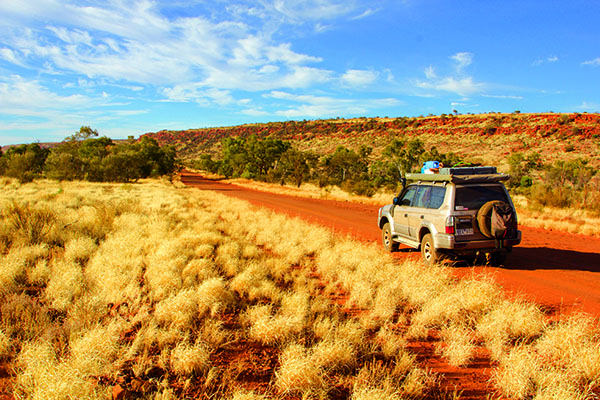


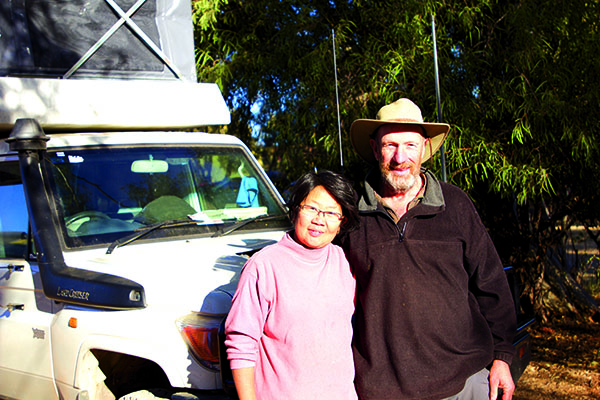
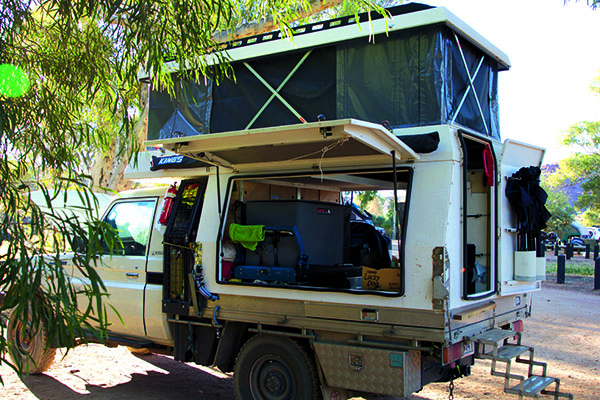
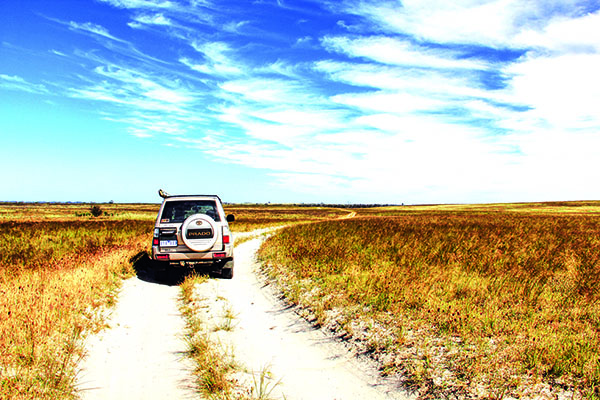
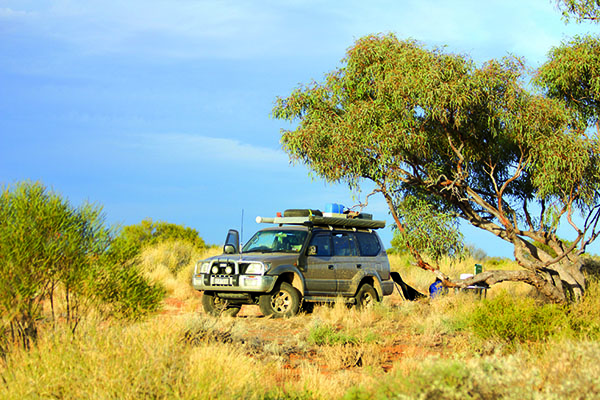
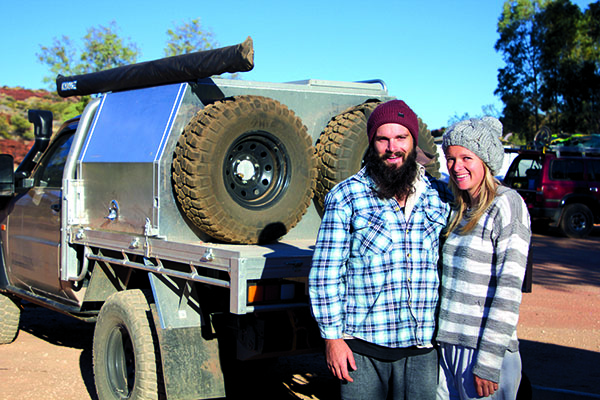
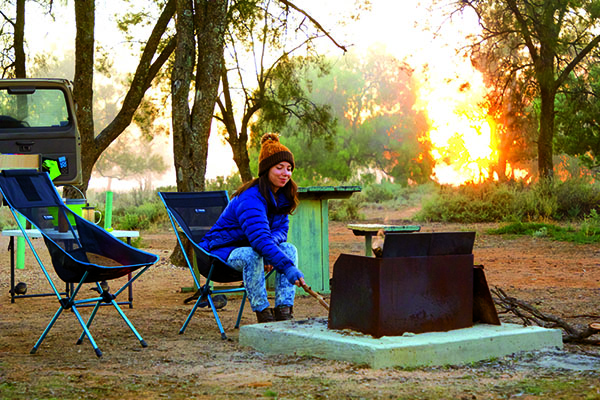
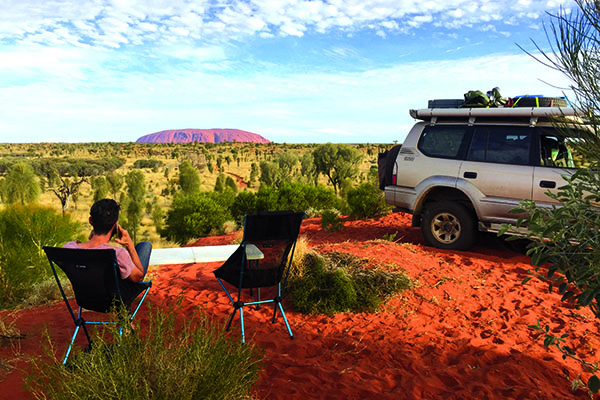
Of course, no one wants to be a total tight arse—after all, you’re on holidays to have a good time! So while we want to keep costs down, we don’t want to miss out on the unique experiences this lifestyle has to offer.
With this in mind, we spoke to some other savvy, money-saving campers to find out how they make their money last. And now you get to reap the rewards, with some budget-friendly essentials to get you out on the highway for the long haul.
KEEP IT SIMPLE: SAVVY SET UPS
For the cash conscious, budgeting starts back when you choose your rig and in keeping costs down as you set up and plan for a trip—all before you actually hit the road.
David and Hany Smith from Geelong, Vic, see budgeting as ‘big picture’, and rather than setting a strict budget while travelling, they did most of their cost cutting before they left. When it came to setting up their rig—a Tommy Camper mounted to the tray of their Toyota LandCruiser ute—David and Hany adhered closely to the KISS method (for those not familiar with this method, that’s: keep it simple, stupid!).
As experienced tourers, David and Hany knew what they wanted in a camper and their priorities for the build centred around maximising space efficiency and maintaining a low centre of gravity, as well as keeping the weight down in order to maximise on fuel efficiency—the number one priority for anyone on a tight budget!
David reckons the Tommy Camper was a good budget build; a basic shell with a canvas pop-top bed. The rig is David’s ongoing project and he’s done most of the internal fit-out himself. He’s kept costs down by repurposing materials he had lying around in the shed, such as wood, poly pipe, scraps of wire and metal, and the various vessels he uses for storing camping gear. He shopped around for second-hand timber and steel and, when buying materials, he says it’s always worth asking for discounts, especially if you can pay cash.
David and Hany’s rig is all about basic functionality and a focus on essential needs—something David stresses throughout our chat. He reckons when it comes to setting up, one way many people end up blowing unnecessary cash is by getting carried away with optional extras, many of which, he says, you don’t really need or use. Not only do they add to your initial set up cost, the weight of these options adds up, impacting your payload and therefore fuel consumption, which increases costs substantially as you travel.
PLANNING AHEAD: SCRIMP TO SPLURGE
When it comes to the cost of living on the road, we’ve heard plenty of figures thrown around —anything from $500 per week to $5000 per month, and all sorts in between. Some people set strict budgets and stick to them at all costs, while others we’ve met tend to be a little looser, while remaining cautious with their spending.
Sue and Trevor Lowe are one such couple. We met Sue and Trevor at a great free camp at Curtin Springs Roadhouse on the Lasseter Highway, NT. They were sitting outside their van, enjoying happy hour and cooking damper with rosemary Trevor had collected from a herb garden at a previous camp (there’s a money saving tip for you!).
Since leaving their Ballina, NSW, home they’d clocked up 10,000km, touring in their 17ft Franklin Arrow caravan, towed by an Isuzu DMAX. While they don’t have a strict budget when they travel, they say they’re generally pretty careful with their spending. They do what it takes to travel around and tend to work it out when they get home, although Sue keeps tabs along the way.
To keep costs at a reasonable level, Trevor advises thinking about what you’ll do in advance and planning for those larger expenses. On this trip they’d splurged on a scenic flight over the Bungle Bungles and were off to check out the Field of Light at Uluru the next day, but the rest of the time they balance these costs by picking and choosing what they’ll see and do, and try to avoid constantly reaching into their pockets for entry fees to museums and sights.
On tour, they spend about two-thirds of their time staying in caravan parks and the last third making the most of free camps, such as Curtin Springs, which helps the money stretch. Although they like to pay their way by ensuring they spend money on other things if they’re staying for free and were planning dinner at the roadhouse’s bistro that evening.
FINDING BALANCE: EXPENSES VERSUS EXPERIENCES
While sticking to a budget can help you stay away longer, you don’t want to spend the entire time in a gravel pit on the side of a highway eating baked beans cold from the can!
Such is the case for Latiesha Killin and Guy Weston, who were just two weeks into an open-ended tour in their Nissan Patrol GU single cab ute pulling a flatbed offroad tandem trailer with a fully enclosed alloy jack-off canopy, when we met them at Finke Gorge National Park, NT.
In that time they’d travelled a fair distance from their Ipswich, Qld, home so the cost of fuel had factored quite heavily on their budget. They’d done their research into what other travellers budgeted for before they left, mostly on Facebook, and were aiming to average somewhere between $500 and $1000 per week.
They’d also splurged on a couple of experiences, like the Stockman’s Show and Dinner at Longreach, but say this was also a highlight, and while they want to keep costs down they don’t want to cut out these kinds of experiences completely.
Latiesha says that while you can easily cut costs by avoiding tours and doing things on your own, you can also miss out on a wealth of knowledge this way. This is an area savvy campers can certainly save a buck or two, though, by making the most of the free guided walks and talks on offer in some national parks.
Their biggest learning so far is to make the most of the many free camping opportunities around the country. They’re totally self-sufficient but were initially a little nervous about staying at rest stops, preferring places where there were more people around. But they’ve found their money isn’t lasting as long as they’d like staying in caravan parks, so they’re now using WikiCamps to make the most of freebies.
They’re also keeping an eye out for opportunities to work, as a way of making the money stretch even further and also to meet people and have a different experience of life on the road.
Guy says more than anything they’re realising it’s the little things that add up, which is a sentiment shared by all the campers we’ve met; small savings here and there can make a really big difference in the long run.
BUDGETING ON THE ROAD: THE QUICK LIST
- Get in control of your cash: set a weekly budget (and try to stick to it!) or at least have a loose idea of what you can afford to spend.
- Set up a direct debit to pay yourself a touring ‘wage’ from your savings account into your access account to keep track of your spending.
- Make the most of free (or low cost) accommodation options whenever possible.
- Slow down: set up in a free/low cost camp for a while and use it as a base for exploring nearby sights.
- Get savvy with your books, apps and websites to find cheap camps, fuel and gas refills —try Tripigy for campgrounds, MotorMouth for cheap fuel and gasbottlerefills.com for gas.
- Save on food by only buying what you need, cutting out some of the luxuries, and hunting for specials and items about to reach their use-by date.
- Save on laundry by doing small loads more regularly by hand, rather than paying for washing machines.
- Collect firewood when you can rather than purchasing bags of wood.
- Create your own fun and look for low cost or free activities rather than expensive tours.
- Learn from others: talk to other campers you meet to tap into their experience.
- Do your research: look for little ways to cut costs—every cent counts, as they say!




